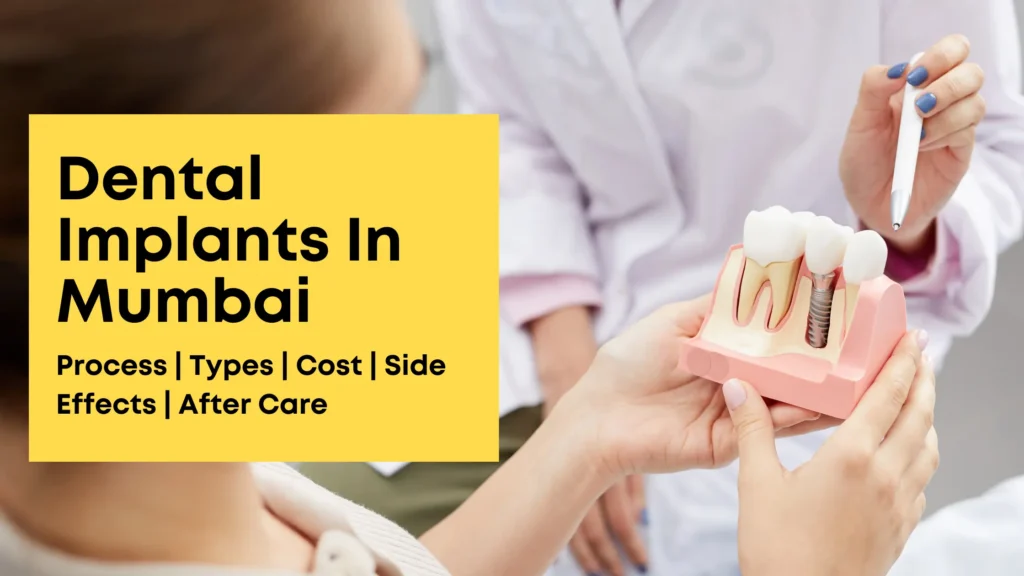
Let’s face it, folks – losing a tooth can feel like you’ve been kicked in the mouth by life itself. But don’t worry! The truth about dental implants in Mumbai is that they’re here to help you save your day (and your smile). So, get ready for an in-depth dive into the world of these small-tooth giants. This article will describe in detail the facts, advantages, and points to ponder regarding this very popular dental procedure so that you will get a proper idea of what exactly you should expect.
What Are Dental Implants?
Imagine if the Tooth Fairy and sci-fi robot had a child: that is essentially what dental implants are. Implants are artificial tooth roots surgically implanted into your jawbone like high-tech seeds, ready to sprout an entirely new set of chompers. The truth about dental implants is that they are intended to look just like natural teeth while simultaneously hiding their true identities as superheroes – much like Clark Kent! Dental implants are artificial tooth roots surgically placed into your jawbone to support replacement teeth. They provide a strong base for fixed or removable replacements designed to look just like natural ones; in fact, dental implants are specifically designed to function, feel, and look similar to your natural teeth.
The Anatomy of a Dental Implant: It’s What’s Inside That Counts
To fully understand the truth about dental implants, it’s important to know their
components:
- The implant serves as the root of a new tooth.
- An abutment provides support and holds onto its crown.
- As the centrepiece, the crown component stands out in any crowd; it is the visible part of your tooth that can be customized to match its natural form and beauty.
Types of Dental Implants
Just as there’s more than one way to skin a cat (though we wouldn’t advise trying!), there are different types of dental implants designed to meet different needs: there are various varieties on offer that cater for specific purposes:
- Endosteal Implants: These implants are usually surgically installed directly into the jawbone and typically consist of titanium screws. Subperiosteal Implants are used for patients who do not possess sufficient bone height, typically placed beneath their gumline but on or above the jawbone.
- Subperiosteal Implants: Placed under the gum but on or above the jawbone. These are used for patients with insufficient bone height.
- Zygomatic Implants: Used when there isn’t enough jawbone for endosteal implants. These are placed in the cheekbone rather than the jawbone.
- All-on-4 Implants: A technique where an entire arch of teeth is supported by just four implants.
- Mini Implants: Smaller than traditional implants, used to stabilize lower dentures or for small teeth and incisors.
Understanding these options is crucial when considering the truth about dental implants
and their suitability for your specific case.
The Truth About Dental Implants In Mumbai: The Good, The Bad, and The Toothy
Now, let’s chew on the truth about dental implants – both the sweet and the sour. They offer numerous advantages:
- Natural appearance and feel: They are designed to appear, feel and function like your natural teeth. Better speech: There is no worry about slipping, as in the case of ill-fitting dentures. Easier eating: It feels like your own teeth, allowing you to take your favourite foods with confidence. Greater comfort: They do away with the discomfort of removable dentures. Higher self-esteem: Dental implants can restore your smile and, thereby, enable you to feel great about yourself.
- Improved oral health: Due to the fact that implants do not need the reduction of other teeth like tooth-supported bridges do, the life of more of the natural teeth is left intact to support long-term health.
- Long-term durability: If properly maintained, an implant can be a life-long lasting restoration.
- Convenience: They never come out of your mouth, and you do not need to use messy adhesives.
However, it’s important to take into consideration all aspects. Dental implants have some possible issues like:
- Surgery is required. Implant placement is a surgical procedure.
- Healing time: The process may take several months, as the implant must join with the bone.
- Costs for the upfronts are higher: compared to other options for replacing teeth, implants are more expensive to begin with.
- Risk of complications: Like any procedure, there are risks.
- The importance of maintaining healthy oral hygiene: Implants need the same attention as natural teeth to avoid infections.
The Dental Implant In Mumbai Process
Dental Implant vs Crown: Selecting between a dental implant and a crown can be like choosing between a smartphone and a flip phone: both make calls, but one offers more bells and whistles. When making this choice, take into consideration:
- Dental implants replace both visible and root parts of a missing tooth, while crowns only replace visible portions and require healthy roots in order to remain functional.
- With proper care, implants may last a lifetime, while crowns typically need replacing every 10-15 years.
- Implants prevent bone loss in the jaw, while crowns do not.
- Dental implants can often provide more long-term savings and health preservation when compared with their crown counterparts in terms of cost and preservation of jawbone tissue.
The truth about dental implants is that although their initial cost might be higher, in terms of long-term cost savings, they often prove to be more cost-effective and healthful solutions than crowns alone
Dental Implants and Braces: Can They Work Together?
Many individuals question whether dental implants and braces can work together. In truth, however, they may be used in certain instances, such as situations requiring orthodontic work, such as missing teeth. Implants can serve as anchors for orthodontic treatments, providing stable points from which other teeth can be moved. Like that helpful kid in class who always offered to help their teacher, implants help move other teeth during orthodontic treatments.
Braces can help prepare the way for implant placement by creating space between teeth, providing for proper alignment and spacing. Implants may then replace any missing ones post-orthodontic treatment – especially in cases of congenitally missing ones. In certain situations, it is possible for a temporary implant to be used during orthodontic treatment and then replaced with a permanent implant after. But timing is vital. In general, dental implants are placed following orthodontic treatment in order to guarantee alignment. Your dentist and implant specialists will work like a well-oiled machine to determine the most effective treatment plan to ensure you get the most effective results.
Side Effects of Dental Implants
Though generally safe, here are the possible side effects of dental implants:
- Infection in the implant area: This can normally be easily treated with some antibiotics.
- Injury to or damage to the surrounding structures: For example, other teeth or blood vessels
- Nerve damage: Will result in pain, numbness or tingling in your natural teeth, gums, lips, or chin
- Sinus problems: Sometimes, when implants are placed in the upper jaw, they can project into the sinus cavities
- Implant failure: Rarely, the implant does not bond with the bone.
- Periimplantitis: This is another gum disease that may develop around the implant and may result in the loss of supporting bone.
But don’t let this list send you running for the hills! Most side effects are minor and treatable. The truth about dental implants is serious complications are not common at all, especially if done by an expert dental professional. Proper aftercare and maintenance significantly reduce the chance of possible complications.
Caring for Your Dental Implants
To ensure the longevity of your implants:
- Maintain healthy oral hygiene: Regularly brush twice daily, floss every day, and use an interdental toothbrush.
- Quit smoking: Smoking cigarettes can weaken bone structure and lead to implant failure.
- Make sure to visit your dentist: Regular visits for professional cleanings and checkups are essential.
- Avoid eating hard foods: Chewing on ice or hard candy can hurt the crown.
- Wear a nightguard if you grind your teeth: This protects your natural teeth as well as implants. Your implants require beauty sleep, too!
The Growing Popularity of Dental Implants In Mumbai
The truth about dental implants is reflected in their increasing popularity. One sign of their increasing popularity can be seen in India’s dental implants market’s remarkable expansion. At USD 108.6 million in 2023, this market size was expected to expand at an average compound annual growth rate of 14.7% until it reached USD 283.2 million by 2030! That’s faster growth than Jack’s Beanstalk! This increase is largely due to the excellent success rate of dental implants. Studies have shown that dental implants are able to achieve an average survival rate of 97% after a year of use, which makes them an excellent long-term option for replacing teeth. Several factors contribute to this growth:
- Increasing awareness about dental health
- Rising disposable income
- Advancements in implant technology
- Growing elderly population
- Increasing prevalence of dental diseases
Who is a Good Candidate for Dental Implants?
The truth about dental implants is that they’re not suitable for everyone. Good candidates typically have:
- Healthy gums
- Sufficient bone density to hold the implant
- Good overall health
- Commitment to good oral hygiene
- Patience for the lengthy treatment process
Certain conditions may complicate or prevent implant treatment:
- Uncontrolled diabetes
- Cancer
- Smoking
- Alcoholism
- Uncontrolled gum disease
Always consult with a dental professional to determine if you’re a suitable candidate for dental implants.
Conclusion
There you go, folks—the truth about dental implants in all their glory: They are a very effective, long-term solution to missing teeth. Admittedly, they do require some very careful consideration and investment, but for many, their pros often offset their cons. They offer a
natural aesthetic, comfort, and durability in tooth replacement that can be life-enhancing in quality. As with all surgical procedures, much lower expectations should be set, and the benefits versus the potential risks should be appreciated. You have to consult a dental professional to find out if dental implants are for you. With good care and maintenance, dental implants may present a lifetime of improved oral health and a blockbuster smile. Remember, a smile is your personal welcome mat to the world. With dental implants, you have the ability to ensure the welcome mat is always out, always bright, and always authentic. So, what are you waiting for? Take the plunge and invest in your smile. After all, you’re worth it
Frequently Asked Questions
Do dental implants hurt?
Since this is a surgical procedure that involves local anesthesia, you would not feel any pain during the procedure. Some discomfort may be expected and easily controlled with pain medication during the healing process.
How much does dental implants cost?
It would depend on a few things: the number of implants, their location, or other procedures to be undertaken. On average, though, it costs any price in the range from ₹30,000 to ₹60,000 per dental implant. It’s important to consider the long-term value when comparing costs with other tooth replacement options. At Smiles Dental Care, Parel, Mumbai the cost of dental implants starts @ ₹ 40,000/- .
It is also important to keep in mind that the treatment cost may go up or down based on the individual case, and specific requirements of the patient. To know the accurate price for yourself just CLICK HERE and book a consultation with our expert today!
Why avoid dairy after a dental implant?
Dairy products should be avoided immediately after implant surgery because they interfere with some of the antibiotics prescribed during this time course. Moreover, some traces of bacteria in the dairy product may again infect the site. Always follow your dentist’s instructions on post-operative care.

